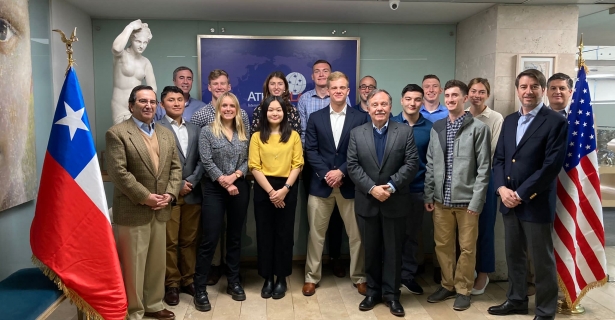On June 1st, we arrived in Santiago, Chile at the Arturo Merino Benítez Airport. Upon arrival we met up with the midshipmen and cadets from the navy and army military academies. The first day involved preparing for our interviews and getting settled in our hotel adjacent to the Costanera Center, the tallest building in Latin America. As active duty members of the military, the cadets and midshipmen bring interesting perspectives when conversing about civil-military relations. We worked to narrow down our research question and split into focus groups. Ultimately, we decided that we are researching the opportunities and challenges associated with Chile's unique geography when it comes to national defense and trade relations.
Our first interview was at Athena Lab which is a private think tank located in Santiago, Chile, which focuses on foreign policy, international relations, and defense. We were very fortunate to speak with the former head of the Navy, Julio Leiva Molina and the former chief of command of the Chilean army General John Griffiths. Key takeaways from this meeting as outlined by Leiva Molina was that Chile is a tri-continental country with access to South America, Oceania through Easter Island, and Antarctica. Furthermore, Chile has control of large sea territories, an economy dependent on maritime trade routes, and claims to the and Arctic territory. It was also very interesting learning about the conflict over Arctic territory. There has historically been tensions between Argentina and Chile about who controls the Antarctic regions closest to the southern tip of South America. We gained a significant amount of knowledge about the geopolitical context in regards to the territorial disputes, and about how even countries who are not in close proximity with Antarctica have an economic or developmental interest in the region. China for example, is strongly aiding Argentina in Antarctic exploration and base building. We also learned that 95% of Chilean trade is conducted by sea with the biggest ports being in San Antonio which is located directly west of Santiago and south of Magallanes. Chile is also ranked fourth out of all countries that use the Panama Canal, after the United States, China, and Japan.
When it comes to territorial integrity, John Griffiths of the army, emphasized that it is important to have a strong relationship between the state, academia, and the private sector in order to maintain “effective sovereignty”. Additionally, similar to other countries in the region, Chile’s population has increased by 7%, mainly due to the influx of immigrants from neighboring countries. Generals Griffiths and Leiva Molina both highlighted the importance of empathetic policy creation in terms of immigrantion. As a group we debriefed our meeting and were all very impressed and grateful for their transparency and willingness to answer challenging questions. We look forward to investigating further challenges in the Antarctic as we head to Punta Arenas, the southern most city in Chile.

